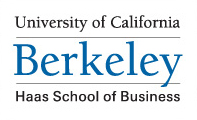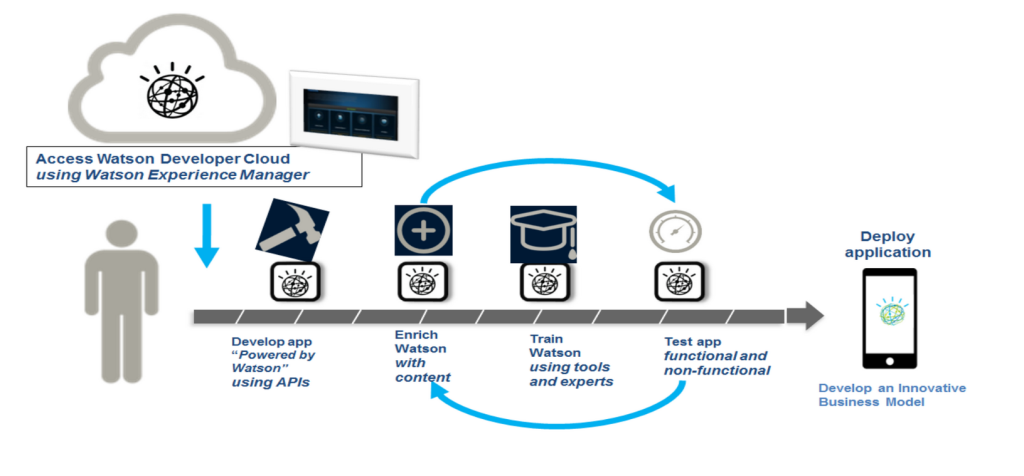UGBA 198
Open Innovation Leveraging IBM Watson
Class Times: TTH 8:00am – 9:30am. Tuesdays: C-320 Thursdays: I – Lab UGBA 198 – 3 Units: Fall 2014
Instructors: Solomon Darwin / Donald Wroblewski
E-mail Address: darwin@haas.berkeley.edu / dewroblewski@berkeley.edu
Office Hours: By appointment
Prerequisites: Instructor approval is needed for registration.
Advisors: Ken Singer, Henry Chesbrough, Jim Spohrer and Nanci Knight
Textbooks: 1) IBM resources listed on the back page 2) Open Business Models. Author: Henry Chesbrough
Course Description:
The objective of the course is to offer technical and business students access to the Watson Developer Cloud to learn about the technical aspects of cognitive computing, including ingesting, building and training a corpus, and then in the second half of the semester, using that information to build a cognitive app and developing a business model as a precursor to taking their ideas to market. The course is intended to help educate and empower the next generation of innovators with an opportunity to ‘change the world’ with their access to Watson. The students taking this course will be among the first to have hands-on access to the cutting-edge Watson technology, enabling them to develop innovative ideas to solve the most pressing problems of industry and society. And from a skills perspective this course will further enhance the students’ marketability. Gartner Inc., a research firm predicts that 4.4 million IT jobs will be created to support Big Data by 2015.
Course Objectives:
- Understand Watson and its underlying technologies
- Develop an abstract of a Watson application that solves a real world challenges
- Formulate a value proposition and identify the target consumers or audiences
- Develop a corpus of data in a domain with types of text content in format supported by Watson
- Understand how corpora is ingested and trained for accuracy.
- Come up with Question/Answer pairs and do some training and scoring
- Build a Mobile application prototype for use with corpus
- Develop a business model to take the application to market (to capture the value created)
MODULE 1
1. Introduction to Cognitive Computing and Watson
- a. General Cognitive Computing overview, what is it, why is it important, how is it evolving
- b. Watson history, philosophy, architecture
2. Special (Optional) Background / Deep Dive Topics – only those relevant topic will be taught
- a. Natural Language Processing fundamentals
- b. Machine Learning
- c. Information Retrieval
- d. Knowledge Representation and Reasoning
- e. Question Answering
- f. Corpus analysis for automatic understanding of the domain
- g. Extracting domain concepts, building dictionaries, taxonomies, ontologies, building a Knowledge Graph
3. Discussion on Building a Corpus of Data
- a. Explore recommended topic domains
- b. Learn how to narrow domain to build a corpus that will maximize Q/A accuracy
4. Building an Application Idea
- a. Specify the business objective: What will the application do? How do you measure overall effectiveness? i.e. business value capture
- b. Analyze the market: What is the state-of-the-art, what solutions already exist, what are the gaps or problems with the current solutions?
- c. Translate business-level objectives into Cognitive Computing requirements
5. Introduction to the Watson Developers Cloud
- a. Functionality, APIs, and tools
MODULE 2
6. Using Representative Application – Content Theory – collection, curation, Corpus development
- a. Process for identifying and gathering content (textual resource acquisition and engineering)
- b. Process for generating resources for the domain (vocabulary, dictionaries, Knowledge Graph, etc.)
7. Understand how to train Watson. Training and Test Theory – evaluation, improvement, iteration, etc.
- a. Study representative examples of the problem
– How to get real users and examples (friends, relatives, subject matter experts, Mech.Turk, etc)
– The role of training, development, and test data
- b. Running experiments, evaluating results, conducting accuracy analysis and making it work better
MODULE 3
8. Mobile App Prototype Development
- a. Assignment: design prototype using any tool
MODULE 4
9. Business Model Planning
- a. Develop an end to end Business Model
See course schedule here
Grading: This is a Pass/No Pass Course – Students need to earn 900 points to pass. The grades will not be contingent on whether the Group wins the $100,000 or not.
Class Attendance 100
Class Participation 100
Mid‐Term 300
Peer Evaluation 100
Final Project 400
Total Points = 1,000
Important Policies that will affect the grade:
- Class participation for cross learning from each other is encouraged –
- No laptop policy: Lecture slides will be provided before the class and group sessions for taking notes.
- Attendance, attentiveness during class and being on time to class will help you greatly.
- Cell phones & Texting & Food is not allowed during class sessions.
Final Student Presentations:
a. The intent of the course is to identify and frame a problem and solve by leveraging access to IBM Watson. Heterogeneous group learning to leverage the diverse experiences, skill-sets, and tacit knowledge is essential.
b. The business model solutions proposed by student groups need to be viable and scalable.
c. The instructors will serve as mentors/consultants/facilitators to each group within the class.
d. The IBM executives will provide a mid-point review to provide feedback and guidance to the students.
e. Selected Senior Executives, relevant to the challenges being addressed, will be invited to judge the final presentations at the end of semester.
f. The winning team will get to compete with other winning teams from the other schools at the New Watson Center in New York in January 2nd or 3rd week. The winning group will be awarded $100,000 in seed funding to be used towards investment in their proposed startup. The winning group will own the IP. A Great Deal !!!
Download Syllabus- Open Innovation Leveraging IBM Watson – UGBA 198 FALL 2014

